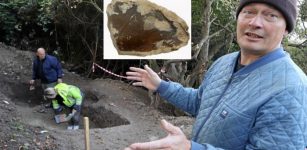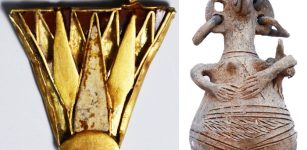Posca: ‘Wine Of The People’ Was Popular In Ancient Rome And Greece
A. Sutherland - AncientPages.com - While pulque (“Drink of the Gods”) is Mexico’s oldest alcoholic beverage of the Maya, Aztecs, Huastec and other cultures in ancient Mesoamerica, posca was the ‘wine of the people’ in ancient Rome and Greece around the second century BC.
At first, posca (the Latin Potor (to drink) or from the Greek epoxos (very sharp), was a medical mixture prepared from sour wine or vinegar with water. Recent studies have shown that posca was actually quite healthy. It had health benefits because it contained vitamin C and its strong acidity easily killed all harmful bacteria. Added flavoring herbs and spices (especially coriander seeds), made posca taste much better.
In ancient Rome, drinking undiluted wine was considered barbaric. Wine concentrate (must) diluted
with water was drunk and posca - the ancient equivalent to cheap 3-2 beer of today - was a particularly common drink among the poorer classes of the society due to its low price and low alcohol content.
Soon the drink also gained popularity among the Roman soldiers and the slaves of ancient Rome.
The widespread use of posca, throughout the Roman period from the 300-200 BC and at the beginning of the Byzantine period, is attested by numerous references in ancient sources such as the natural histories of Pliny the Elder to the comedies of Plautus (second century BC). In the Byzantine army the drink was actually called the phouska.
See also:
Pulque: Ancient Drink Of The Gods Is Popular Again But It Has Odd Side-Effects
Scipio Africanus – Rome’s Greatest General Who Defeated Unbeatable Hannibal
Mead: Secret Drink Of The Vikings And Gods – Was It An Ancient Antibiotic?
Some of the higher ranks of the Romans drinking posca was Scipio Africanus, general and the greatest of the famous Roman family of the Scipios, aristocrats and militaries that commanded armies in the Empire, and Metellus, a prominent politician, who in this way wanted to express their solidarity with army soldiers.
As recorded by biographer, essayist, philosopher, Plutarch (46 AD - 120 AD), yet another posca drinker was a Roman senator and historian, Cato the Elder (234–149 BC) and according to the Roman collection of biographies known as “Historia Augusta”, Hadrian (Roman emperor from 117 to 138) who "actually led a soldier’s life”, was also one of the posca drinkers when in military campaigns.
The same source records that by Hadrian’s time, sour wine was a standard part of the normal "camp fare" (cibus castrensis). Officially, a decree dated to 360 AD instructed that lower ranks of the Roman army should drink posca and wine on alternate days.
No exact recipe for the drink survived until today. However, the drink can be recreated according to this recipe:
Posca recipe
1.5 cups of red wine vinegar.
0.5 cups of honey.
1 tablespoon of crushed coriander seed.
4 cups of water.
Boil it so that the honey dissolves.
Let it cool down so that it reaches room temperature.
Filter the coriander seeds.
Written by – A. Sutherland - AncientPages.com Senior Staff Writer
Copyright © AncientPages.com All rights reserved. This material may not be published, broadcast, rewritten or redistributed in whole or part without the express written permission of AncientPages.com
Expand for referencesMore From Ancient Pages
-
 Rare Discovery: Giant Stone Artifacts Found On Ice Age Site In Kent
Archaeology | Jul 6, 2023
Rare Discovery: Giant Stone Artifacts Found On Ice Age Site In Kent
Archaeology | Jul 6, 2023 -
 Advanced Technology Of The Ancients: Artificial Platforms Of Mighty Nan Madol
Civilizations | Sep 14, 2018
Advanced Technology Of The Ancients: Artificial Platforms Of Mighty Nan Madol
Civilizations | Sep 14, 2018 -
 11,000-Year-Old Human Remains Found At Heaning Wood Bone Cave In Britain
Archaeology | Jan 25, 2023
11,000-Year-Old Human Remains Found At Heaning Wood Bone Cave In Britain
Archaeology | Jan 25, 2023 -
 1,800-Year-Old Buddhist Stupa And Relics Discovered Near Bazira, The Ancient City Of Alexander The Great
Archaeology | Feb 11, 2022
1,800-Year-Old Buddhist Stupa And Relics Discovered Near Bazira, The Ancient City Of Alexander The Great
Archaeology | Feb 11, 2022 -
 Whose Ancient Burials Are Hidden Inside The Vatican City’s Walls?
Archaeology | Mar 11, 2021
Whose Ancient Burials Are Hidden Inside The Vatican City’s Walls?
Archaeology | Mar 11, 2021 -
 Huge Statue Of Pharaoh Ramesses II Unearthed In The Ancient City Of Hermopolis
Archaeology | Mar 4, 2024
Huge Statue Of Pharaoh Ramesses II Unearthed In The Ancient City Of Hermopolis
Archaeology | Mar 4, 2024 -
 Unsolved Archaeological Mystery Of Ta Prohm Temple, Cambodia
Civilizations | Sep 3, 2018
Unsolved Archaeological Mystery Of Ta Prohm Temple, Cambodia
Civilizations | Sep 3, 2018 -
 Adaptable And Flexible Neanderthals May Have Inhabited Danish Island 120,000 Years Ago
Archaeology | Oct 25, 2020
Adaptable And Flexible Neanderthals May Have Inhabited Danish Island 120,000 Years Ago
Archaeology | Oct 25, 2020 -
 The Real Paleo Diet: New Archaeological Evidence Changes What We Thought About How Ancient Humans Prepared Food
Featured Stories | Nov 28, 2022
The Real Paleo Diet: New Archaeological Evidence Changes What We Thought About How Ancient Humans Prepared Food
Featured Stories | Nov 28, 2022 -
 Stunning Gold Jewelry And Artifacts From The Time Of Nefertiti Found In Bronze Age Tombs In Cyprus
Archaeology | Dec 2, 2021
Stunning Gold Jewelry And Artifacts From The Time Of Nefertiti Found In Bronze Age Tombs In Cyprus
Archaeology | Dec 2, 2021 -
 Mystery Of The Lost Cahuenga Pass Treasure: Baffling Unexpected Deaths Caused By A Curse Or Natural Causes?
Featured Stories | Nov 2, 2018
Mystery Of The Lost Cahuenga Pass Treasure: Baffling Unexpected Deaths Caused By A Curse Or Natural Causes?
Featured Stories | Nov 2, 2018 -
 Extraordinary Biblical Frescos Uncovered In Domitilla Catacombs
Archaeology | Jun 3, 2017
Extraordinary Biblical Frescos Uncovered In Domitilla Catacombs
Archaeology | Jun 3, 2017 -
 Ancient Copper Ingots Are Unlocking Iron Age Secrets
Archaeology | Dec 13, 2021
Ancient Copper Ingots Are Unlocking Iron Age Secrets
Archaeology | Dec 13, 2021 -
 Ancestral Māori Adapted Quickly In The Face Of Rapid Climate Change – New Study Shows
Archaeology | Nov 10, 2022
Ancestral Māori Adapted Quickly In The Face Of Rapid Climate Change – New Study Shows
Archaeology | Nov 10, 2022 -
 Runes Were Just As Advanced As Roman Alphabet Writing – New Study
Archaeology | Mar 3, 2023
Runes Were Just As Advanced As Roman Alphabet Writing – New Study
Archaeology | Mar 3, 2023 -
 First Early Roman Fortlet Found On The Isle of Anglesey, North Wales
Archaeology | Nov 26, 2015
First Early Roman Fortlet Found On The Isle of Anglesey, North Wales
Archaeology | Nov 26, 2015 -
 Aegir – Jotun Lord Of The Stormy Seas Revered And Feared By Norsemen
Featured Stories | Sep 6, 2019
Aegir – Jotun Lord Of The Stormy Seas Revered And Feared By Norsemen
Featured Stories | Sep 6, 2019 -
 Large Ancient Egyptian Astronomical Observatory In The Buto Temple Discovered In Kafr El-Sheikh, Nile Delta
Archaeology | Oct 9, 2024
Large Ancient Egyptian Astronomical Observatory In The Buto Temple Discovered In Kafr El-Sheikh, Nile Delta
Archaeology | Oct 9, 2024 -
 10 Great Ancient Mysteries Of North America
Featured Stories | Sep 30, 2015
10 Great Ancient Mysteries Of North America
Featured Stories | Sep 30, 2015 -
 Only Known Roman ‘Lorica Squamata’ Legion Armor Restored
Archaeology | Jun 27, 2024
Only Known Roman ‘Lorica Squamata’ Legion Armor Restored
Archaeology | Jun 27, 2024

